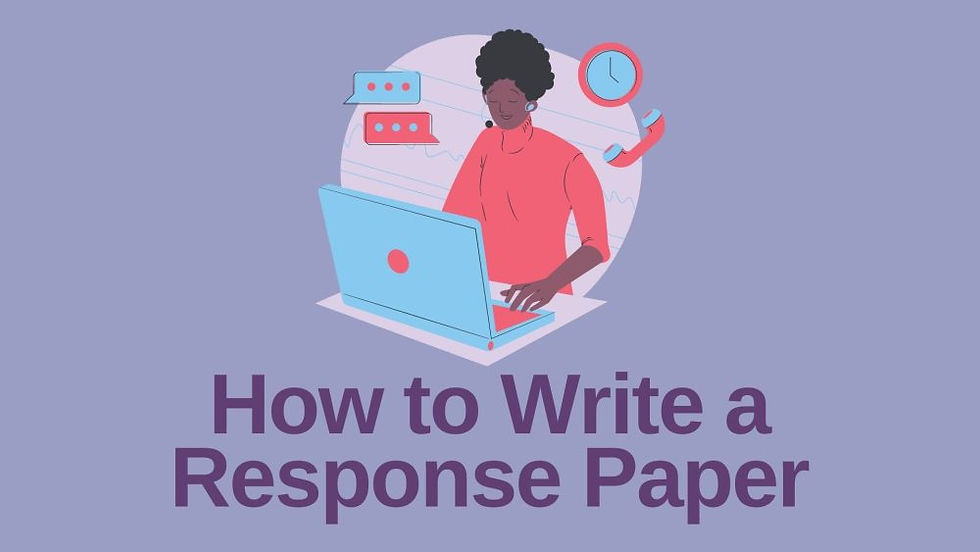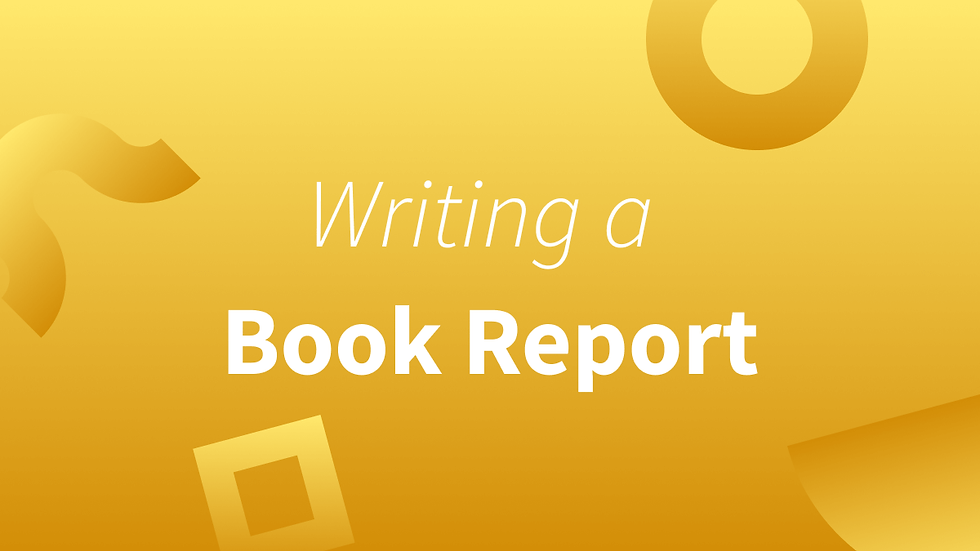A response paper: what is it?
- Wayne Kisanyanya
- Jan 20, 2024
- 5 min read
A response paper is an assignment where you are given a prompt, an article, or a text by your professor and asked to write a response to it. A response paper's main objective is to show that you comprehend the subject that has been assigned to you. This entails actively reading the prompt's content and answering it in a way that demonstrates your comprehension of the text and any other resources you are responding to. When composing a response paper, keep in mind that your primary objective is to demonstrate to your instructor or professor that you comprehend the readings that are associated with the response paper you are writing.
In light of this, it is sad that producing a response paper necessitates that you comprehend the subject matter. You must read this article if you are writing a response to an article since your professor will be evaluating your response paper based on how well they believe you comprehended the assignment. The same holds true for a book. Your professor will be particularly interested in how well you comprehend the content if you are answering to a prompt and are required to perform further study. Writing a response paper necessitates demonstrating your comprehension of the subject matter, thus you cannot "wing" it like you can many essays. Your grade will decrease significantly if you don't.
While some response papers require you to write exclusively about the book or other given material, others may also ask you to connect the topic of your writing to events in your own life or the wider world. These answer papers, which are frequently referred to as reflection papers, are intended to get your individual thoughts on the prescribed topic. Knowing the content is still essential when writing a reflective response paper of this kind as, after all, your instructor or professor will grade your work based on how well you comprehend the material you are responding to.
But in the end, the main notion of a response paper is that you are answering a prompt, book, or article by showing that you comprehend it and, occasionally, by offering criticism. Teachers and instructors give response papers to ensure that you are finishing your readings and to demonstrate your understanding of the subject matter. In order to ensure that your professor understands you are not writing gibberish and that you have studied the supplied material, you must ensure that you have read the underlying materials in order to receive a good score on your answer paper.

SUMMARY OF AN ESSENTIAL PAPER
Making sure you comprehend the subject matter of the response paper you are writing is the first and most crucial step in the writing process. To effectively answer to a prompt, article, or text, it is imperative that you possess a thorough understanding of the subject matter being discussed. One of the rare essay genres where you can't just wing it is the response paper. Your professor will be expecting you to know what you're writing about. "Bullshit" has no place in a response paper. Your lecturer will quickly catch on to it. When writing a response paper, you really need to know what you are writing about, thus you should read the supporting resources.
It's time to develop a thesis statement or an angle after you've made sure you comprehend the information or text you are responding to in your response paper. You won't have a formal thesis if your response paper is merely one page or one paragraph in length. Instead, you will have an angle—a thesis-like statement that highlights how you are concentrating on a specific aspect of the material you are responding to. Your angle will direct how you answer to the text or prompt and serve as a representation of the critical analysis you have done of the source material. You will get a decent score on your answer paper if your angle is well-reasoned and connected to the underlying materials.
To answer to the assignment given to you, if you are writing a longer response paper, you will need to include a thesis statement and several body paragraphs with supporting evidence. For these kinds of extended answer papers, you will need to adhere to the conventional essay format, which consists of a thesis followed by body paragraphs that all support the thesis you are defending. Similar to an essay or research paper, your response paper's conclusion should serve as a place for reflection on the material you have read and learned. It should not contain any new information.
Finally, response papers occasionally require you to write in the first person and share your personal thoughts regarding the topic you were given to write about. While writing an academic essay or research paper, it is often discouraged to write in the first person. However, if you are writing a response paper, you should ask your teacher or professor if this is OK. Your professor would usually encourage you to write in the first person while writing a response paper since they are interested in your grasp of the material you have been assigned as determined by your thoughts on it.
FORMULATING A REACTION PAPER
There are various formats for response papers. It is common for short answer papers to be turned in without a title page or references. Perhaps all you're doing is uploading your response paper to the discussion board of your online course. Your teacher or professor may occasionally require you to cite sources for the topic of your response paper, and they may not always ask for one. However, quick answer papers typically have casual formatting, so you won't likely lose a lot of marks for formatting mistakes.
However, you will need to follow your professor's or teacher's instructions regarding the reference style and related style guide while writing a lengthy response paper. Extended response papers should be formatted like research papers or essays because that is what they are. As with any other essay or research paper, you should format your answer paper formally by using a style guide such as APA, MLA, Chicago, or Harvard if it is longer than two pages or requires the inclusion of extra sources. When writing a longer response paper, make sure you properly credit all of your sources to prevent being accused of plagiarism.
DISTINGUISHING ASSESSMENTS FROM RESEARCH PAPERS: WHAT ARE THEY?
The primary distinction between a research paper and a response paper is that the former limits your options about the subject matter you write about. Your objective when writing a response paper is to address the prompt, text, or article that your professor has given you and figure out a way to connect it to something else you have learned in class, your life, or the outside world. A research paper, on the other hand, is somewhat longer than a response paper and usually gives you far more freedom in terms of topic selection. Writing a response paper demands you to adhere to the supplied content and show that you have a thorough comprehension of it, but a research paper is more flexible in how you will approach your selected topic via your thesis. Longer response papers will require more research because you will be expected to include ideas from other academic papers into your response; nevertheless, this is the exception rather than the rule when writing a response paper.



Comments